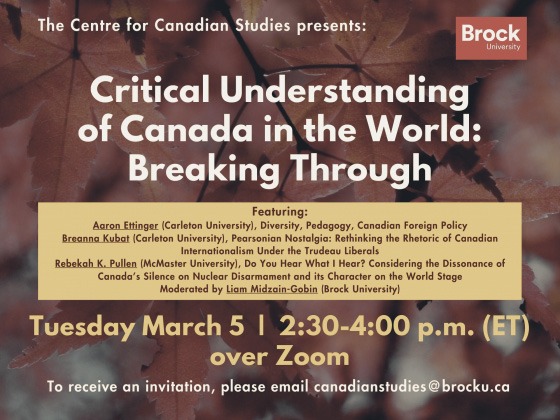With the ever-evolving landscape of international relations, it is as vital as ever for students and Canadians at large to critically engage with and question Canada’s foreign policy.
On March 11, the Department of Political Science hosted a virtual speaker series titled “Critical Understandings of Canada in the World: Towards a Global Understanding of Canada.” This session, along with several others of the same nature across Canadian universities, is meant to engage students and academics in a new book project under the same name as the speaker series.
“We want the chapters to be able to speak to each other. So, we tried to put the panels together in a way to have contributors be able to join in and be able to ask questions, discuss and hear what each other are working on in their chapters,” said Dr. Liam Midzain-Gobin.
The objective of the virtual speaker series was to engage different audiences in the book and to encourage discussions between contributors and other groups, including Brock students.
The draft chapters for the upcoming book presented in the virtual panel highlighted new understandings of Canadian foreign policy that expand beyond traditional considerations of trade and security as the primary tenets of the area of study. Some notable presentations included Dr. Stephen Brown’s deconstruction of Canada’s image as a “Queertopia” by analyzing Canada’s existing contributions to global LGBTQI+ rights while noting that these do not entail a leadership role for Canada.
Dr. Liam Midzain-Gobin, an Assistant Professor of Political Science at Brock University, moderated the speaker series on March 11. More broadly, Dr. Midzain-Gobin is one of the editors of an upcoming research publication, which he initially became involved in after the core editorial team reached out to include him in the book project.
The editorial team is composed of four scholars from different Canadian universities. As such, Dr. Midzain-Gobin has closely worked with Dr. Heather Smith from the University of Northern British Columbia, Dr. David Black from Dalhousie University and Dr. David Hornsby from the Norman Paterson School of International Affairs (NPSIA) at Carleton University.
The upcoming handbook on Canadian foreign policy is set to include over 35 chapters written by various contributors, and its structure will encompass five cross-cutting thematic sections.
The book’s first thematic area is called “As If People Matter,” referring to people’s ability to politically engage with the Canadian state, as well as the engagement that Canada sustains with groups of people that compose what we know as “Canada.”
Next, the book will focus on national security from the viewpoint of “Insecurities” by noting the root causes of vulnerabilities and fear among Canadian citizens.
Third, “Towards a Global Politics” will decentre the state as the principal actor in international affairs by analyzing other equally relevant relationships that exist in the study of foreign affairs.
The fourth pillar of the book will encompass “Myths and Stories We Tell Ourselves,” about the gap that exists between rhetoric and action in Canadian foreign policy, guided by “stories” and “myths” about Canada’s behaviour.
“[Canada] may say a lot, but are we actually doing the things we say are important to do?” said Dr. Midzain-Gobin.
The online panel on March 11 explored this thematic area through Dr. David McDonald’s draft chapter on the myth of Canadian niceness, and how the rhetoric has historically allowed Canada to recognize genocide overseas while legitimizing settler colonialism domestically.
“Relationships, Connections and Contradictions,” the fifth theme area in the book, will dive into how Canada presents itself to various audiences, and the contradictions that arise from those portrayals. This analysis will encompass the relationships that Canada holds with other nations, and the role that contradictions play in the larger conversation of Canada’s foreign policy.
Though it may be easy to characterize foreign policy through a restricted lens of security and trade, the book seeks to reframe and expand our understanding of foreign policy, mainly to address the complex issues that the world faces today.
“The problems that we are facing are not often ones that are going to be solved by bombs. They are not going to be solved by more corporations going in. In fact, those may be part of the problem. If we want to tackle climate change, if we really want to look at the way Canadian corporations act abroad, that’s going to mean a slightly different approach to how we understand our place in the world. That’s what I hope people take away from the volume,” said Dr. Midzain-Gobin.
The book project will assist in reshaping the understanding of Canada’s role on the global stage by critically analyzing aspects of foreign and domestic policy that often go unnoticed in the study of Canada’s foreign policy.
The book project “Critical Understandings of Canada in the World: Towards a Global Understanding of Canada” is estimated to be out by the end of 2025. Dr. Liam Midzain-Gobin can be reached at lmidzaingobin@brocku.ca.


